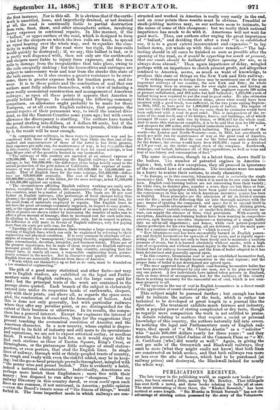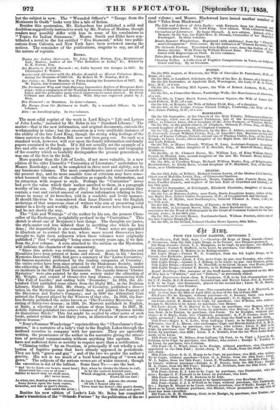PUBLICATIONS RECEIVED.
The late torpor in the publishing world, as regards new books of pro- mise, has been stirred a little, mainly by Mr. Bentley. That bibliopole has seat forth a novel, and three books relating to India all at once. The most interesting of these three, the " Khakee Ressalah," has been noticed at some length. "Six Months in British Burmah" has not the advantage of stirring action possessed by the story of the Volunteers,
BOOKS.
?twice for Indian Statesmen. By John Bruce Norton, Esq., Barrister-at- Law, Madras, Author of the "The Rebellion in India," &c. Edited by G. R. Norton, Esq.
Six Months in British Burmah : or, India beyond the Ganges in 1857. By Christopher T. Winter.
Service and Adrenture with the Ehakee Ressalah or Jfeerut Volunteer Horse, during the Mutinies of 1857-'58. By Robert H. W. Dunlop, B.C.S.
Our Crisis; or, Three Months at Patna during the Insurrection of 1857. By W. Taylor, late Commissioner of Patna.
The Permanent Way and Coal-Burning Locomotive Boilers of European Rail- ways; with a comparison of the Working Economy of European and American Lines, and the principles upon which improvement must proceed. By Zerali Colbum and Alexander L. Holley. With fifty-one engraved plates by J. Bien.
.Era Desmond: or Mutation. In three volumes.
My Escape from the Mutineers in Oudh. By a wounded Officer. In two volumes.
Rita: an Autobiography. In two volumes.
The most solid reprint of the week is Lord King's "Life and Letters of John Locke," included by Mr. Bohn in his "Standard Library." The matter—that is the new information, and original documents, exceeds the workmanship in value ; but the execution is a very creditable instance of the ability of the late Lord King, though the strong whig feelings of the times anterior to the Reform Bill now and then peep out. Its rank as a standard work, however, will rest upon the family information and family papers contained in the book. If it did not actually set the example of a free and able use of family papers to illustrate the history and biography of the country which so laudably distinguishes the present generation, it was one of the first in the field.
More popular than the Life of Locke, if not more valuable, is a new edition of the elder Disraeli's "Curiosities of Literature," undertaken by Messrs. Routledge ; and to be completed in three neat and sightly, not to say handsome volumes. The more comprehensive and exact research of the present day, and its more sensible tone of criticism may have some- what lessened the value of the collection as regards its information, and its attraction with respect to style. Perhaps the "Curiosities" never had quite the value which their author ascribed to them, in a paragraph worthy of his son. (Preface, page xliv.) But beyond all question they contain a vast and varied amount of curious information relating to lite- rature in many of its branches, told in a readable and lively manner. It should likewise be remembered that Isaac Disraeli was the English archetype of that numerous class of writers who aim at presenting solid matter in a lively and worldly style. He would never have been passed, had he not shown the way.
The "Life and Writings" of the author by his son, the present Chan- cellor of the Exchequer, is rightfully prefixed to the "Curiosities." This sketch is about one of Benjamin's best things. The thoughts are juster, the style-easier and less inflated than in anything else which he has done ; the impartiality is also remarkable. "Some notes are appended to illustrate or to correct the text, where more recent discoveries have brought -to light facts unknown when these volumes were originally published ;" that " originally " being some seventy years ago, if we date from the first volume. A note attached to the section on the Mysteries, will indicate the character of the commentary.
"Since this article was written, many of these ancient Mysteries and Moralities have been printed at home and abroad. Hone, in his Ancient Mysteries Described,' 1825, first gave a summary of the Ludus Coventrim,' the famous mysteries performed by the trading companies of Coventry; the entire series have been since printed by the Shakspeare Society, under the editorship of Mr. Halliwell, and consist of forty-two dramas, founded on incidents in the Old and New Testaments. The equally famous 'Chester Mysteries' were also printed by the same society under the editorship of
. Wright, and consist of twenty-five long dramas, commencing with
The Fall of Lucifer,' and ending with Doomsday.' In 1834, the Ab- botsford Club published some others from the Digby MS., in the Bodleian Library, Oxford. In 1825, Mr. Sharp, of Coventry, published a disser- tation on the Mysteries once performed there, and printed the Pageant of the Sheremen and Taylor's Company; and in 1836 the Abbotsford Club printed the Pageant played by the Weavers of that city. In 1836, the Sur- tees Society published the series known as The Towneley Mysteries,' con- sisting of thirty-two dramas ; in 1838, Dr. Marriott published in English, at Basle, a selection of the most curious of these dramas. In 1837, M. Achille Jubinal published two octavo volumes of French Mysteres inedits du Quinzieme Bieck.' This list might be swelled by other notes of such books, printed within the last thirty years, in illustration of these early re- ligious dramas."
" Rosa's Summer Wanderings" reprintedfrom the "Churchman's Com- panion," is a narrative of a lady's visit to the English Lakes through the midland counties in company with her parents. They are agreeably written, the prominence of the author in the narrative giving the attrac- tion of personal companionship without anything like egotism. They have not sufficient force or novelty to require more than a notification. "Chiming trifles" by an Oxonian, is principally if not wholly a col- lection of fugitive poems that have already appeared in periodicals. They are both "grave and gay " ; and of the two we prefer the author's gravity. His wit is too much of a local kind smacking of "town and gown." The subjects of the serious verses are of wider interest; though the execution is not of the loftiest. Some lines To—are the best.
but the subject is new. The "Wounded Officer's" "Escape from the Mutineers in Oudh" looks very like it tale of fiction.
Besides this quaternion, Mr. Richardson has published a solid and doubtless suggestively instructive work by Mr. Norton of Madras, though readers may possibly differ with him in some of his conclusions in "Topics for Indian Statesmen." Messrs. Smith and Elder have con- tributed a novel to the list entitled "Eva Desmond," while two publi- cations from Calcutta and New York have been reviewed among the notices. The remainder of the publications, singular to say, are all of the nature of reprints.
"Sad 'tis to think our hearts must beat But, when he thinks the bloom to cull, Dissevered far—not as of yore : Is by the current hurried past,
Sadder to know that we shall meet, Which sluggish, seemingly, and dull, As when one, floating down the stream, So have I fared. Adown the stream
Some flower upon the bank espies, Of life I floated idly on ; Ah never more. Flows all too fast : Graceful, and fair as poet's dream, Thou west the flower—the poet's dream. And seeks the prize ; Both past and gone.
Besides his new edition of Locke's Life Mr. Bohn has completed Ikee'a translation of the "Orlando Furicao" by the publication of the se- cond volume • and Messrs. Blackwood have issued another r of their "Tales from Blackwood." numbe The Life and Letters of John Locke : with Extracts from his Journals and Commonplace Books. By Lord King. New edition. With a General Index. Curiosities of Literature. By Isaac Disraeli. A new edition. Edited, with a Memoir, by his Son, the Right Hon. B. Disraeli, Chancellor of her Majesty's Exchequer. In three volumes.
Rosa's Summer Wanderings. Reprinted (with additions) from the "Church man's Companion." First series. By the Authoress of" Floreat Ecclesia," The Orlando Furioso. Translated into English verse, from the Italian of La. dovico Ariosto. With Notes by William Stewart Rose. New edition. jiar.. trated with Engravings on Steel. In two volumes.
Tales from Blackwood. Volume II.
Chiming Trifles. A Collection of Fugitive Compositions in Verse, on Subjects Grave and Gay. By an Oxonian.



























 Previous page
Previous page